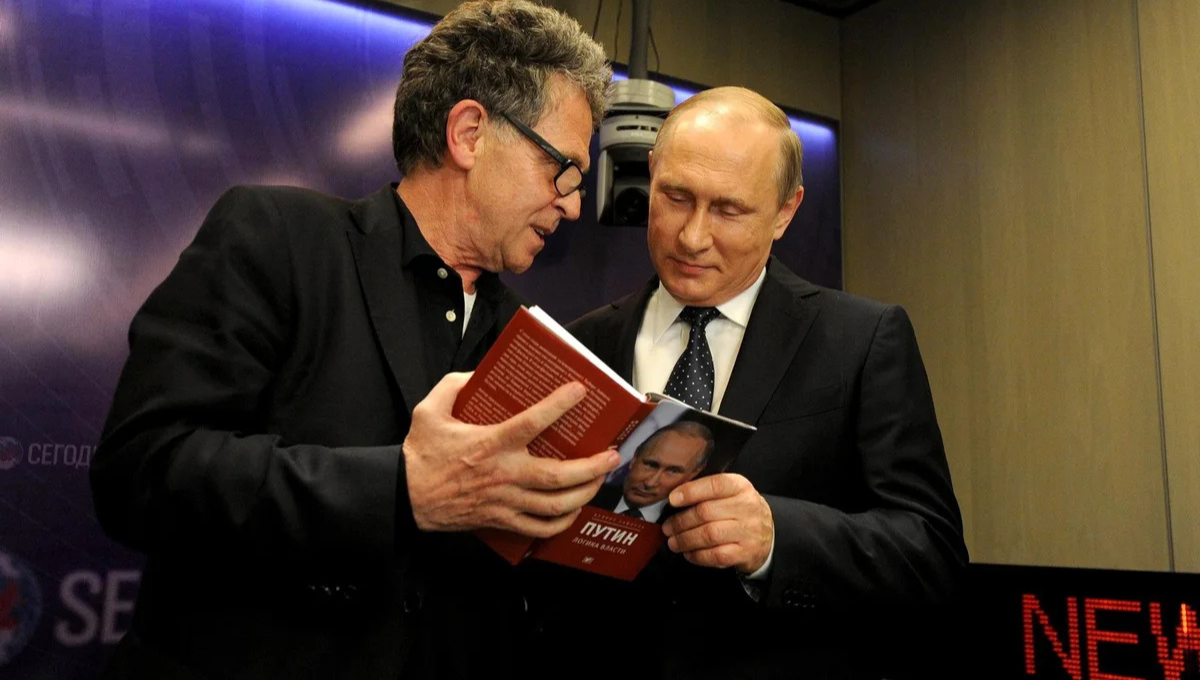A joint investigative report has uncovered that Hubert Seipel, a prominent German journalist known for his extensive coverage and exclusive access to Russian President Vladimir Putin, secretly received €600,000 (approximately $700,000) from entities linked to Russian oligarch Alexey Mordashov, a close ally of Putin currently under Western sanctions. The revelations arise from a major leak of confidential financial records based in Cyprus obtained and analyzed by a consortium of journalists from Paper Trail Media, Der Spiegel, ZDF, and others as part of the global probe dubbed “Cyprus Confidential”.
Who is Hubert Seipel?
Hubert Seipel is a veteran journalist, documentary filmmaker, and author regarded as one of Germany’s foremost experts on Russia and Vladimir Putin. Over his career, he has produced award-winning documentaries and written two books about Putin, describing him with apparent insider knowledge. One of his key claims is that he has had direct personal access to Putin nearly 100 times, positioning himself as a rare Western journalist with intimate knowledge of the Russian leader.
Seipel’s 2015 book “Putin: Inner Views of Power” and his subsequent 2021 work “Putin’s Power: Why Europe Needs Russia” have been widely read and presented as objective examinations of Putin and Russia’s political environment. He has also been known for an exclusive 2014 interview with Putin broadcast by German public broadcaster Norddeutscher Rundfunk (NDR).
What the Leak Reveals
The Cyprus Confidential investigation is based on a leak of 3.6 million files from Cypriot financial services firms involved in offshore company registration and consulting. These records show that in 2018, Seipel signed a “sponsorship agreement” worth at least €600,000 with a Cyprus-based company connected to Alexey Mordashov’s steel and mining conglomerate Severstal. Mordashov is one of Russia’s richest men and has been sanctioned by the U.S., EU, and UK for his close ties to Vladimir Putin and alleged role in enabling Kremlin policies.
Documents further reveal a handwritten note referencing a similar prior agreement in 2013 for a “Putin biography,” implying that Seipel’s earlier book from 2015 was also backed by the same or related sources. The sponsorship money was tied to Seipel’s promoting and authoring the 2021 book exploring Russia’s political climate. The funding was reportedly paid in two installments between 2018 and 2019 via a British Virgin Islands company linked to Mordashov.
Despite these arrangements, neither Seipel disclosed this sponsorship or potential conflict of interest to his readers, his publishers, or the broadcasters airing his work. Hoffmann und Campe Verlag, which published both books, stated it was unaware of the sponsorship deals and reserved the right to take further action pending the allegations’ verification. Similarly, German public broadcasters NDR and ARD said they were not informed of the payments and expressed concerns about transparency and journalistic ethics. NDR said it was considering legal steps against Seipel and underlined the seriousness of the revelations.
Seipel’s Response
Seipel confirmed receiving financial support from Mordashov but maintains the payments came from the oligarch’s private funds and were strictly for the book projects. He has denied that the funding influenced the content or compromised his journalistic independence, referencing a contractual clause noting he owed no obligation to the sponsor regarding the book content. Seipel rejected accusations of being a Putin agent, emphasizing his legitimate professional relationship and frequent personal contacts with Putin as the basis for his work. He also stated he has never accepted payments from third parties for his documentaries or televised interviews.
The disclosure has raised questions about the potential influence of Russian Kremlin-linked money on Western media and literature, casting doubts on the integrity and independence of Seipel’s work given the undisclosed financial ties.
Broader Context: Russian Influence and Cyprus Leaks
The Cyprus Confidential leak also sheds light on the role of Cyprus as a chief offshore financial hub facilitating secretive payments and asset hiding for Russian oligarchs and elites linked to Putin. PwC Cyprus, a major player, was found to have been deeply involved in orchestrating such arrangements until the post-Ukraine invasion sanctions forced a cutoff of many Russian clients.
This scandal is part of wider concerns about Russia’s sophisticated use of covert financial levers and propaganda networks to shape narratives abroad, including in Europe, the Americas, and beyond. The investigation underscores the challenges faced by independent journalism in safeguarding objective reporting amid clandestine foreign funding.
Statements from Related Entities
- Hoffmann und Campe Verlag, Seipel’s publisher, stated it had no knowledge of the secret sponsorship agreement. The company emphasized it might consider taking further legal or editorial measures if the allegations are confirmed.
- German public broadcaster NDR acknowledged the seriousness of the revelations, stating it was unaware of the financial dealings and is contemplating legal action to address potential violations of journalistic standards.
- ARD declined to comment officially on the issue, while the Kremlin and Russian officials also refrained from commenting on the investigation’s findings.
- Seipel himself has defended the legitimacy of his relationship with Mordashov, insisting that his works were produced independently and remained untainted by the sponsorship.
Impact and Next Steps
The disclosure that a leading German journalist with notable access to the Russian president secretly accepted hundreds of thousands of euros from a Putin ally has sent shockwaves through Germany’s media and political establishments. Media analysts suggest that this could prompt renewed scrutiny of journalistic independence, potential conflicts of interest, and the regulatory frameworks governing sponsorship disclosures in publishing and broadcasting.
Germany’s media watchdogs, publishing sector, and journalistic unions are expected to weigh in on whether Seipel’s conduct violated ethical standards. The case may also encourage broader investigations into similar undisclosed financial relationships that could compromise reporting on politically sensitive international topics.
Given Mordashov’s sanctioned status and the geopolitical context of Russia’s war in Ukraine, the revelations add an extra layer of controversy and sensitivity to this episode.
In summary, the leak of confidential financial records has unveiled a significant undisclosed financial relationship between Hubert Seipel, an influential German journalist noted for his Putin coverage, and a Kremlin-connected oligarch. This development exposes potential vulnerabilities in media integrity and raises urgent questions about transparency in international journalism when dealing with powerful and politically entangled figures.


